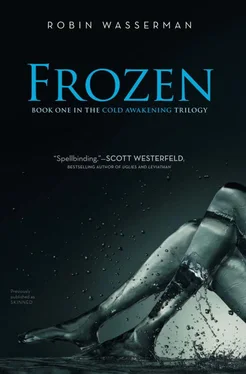“Something was true,” I admitted, standing up. “You all need to get a life.”
I prepared a story for my parents, something bright and shiny about how caring everyone had been, how wonderfully supportive—maybe so supportive that I’d been entirely readjusted and wouldn’t need to go back. But it was a story I never got the chance to tell. Because when I got home, there was a strange man sitting on the couch, across from my father. A man I’d seen before.
My father beckoned, indicating that I should join them.
“This is the Honored Rai Savona,” he said. “Leader of the Faith Party. He’s come out here to apologize for the incident earlier when you first came home. The man who accosted you on our property?”
I hadn’t told my father about the man in the woods—and I could tell from his look that he wasn’t happy about it. But I knew he would never have admitted his ignorance to a stranger, and if I let it slip, things would be even worse. So I sat down and kept my mouth shut. The man kept his dark eyes on my father. I recognized him from the protest: He’d been the one in charge, the one who finally called it off.
“As I say, M. Kahn, his actions were in no way endorsed by the party, and he has been disciplined. A well-intentioned but sorely misguided soul. I take full responsibility for his trespassing and any damage he may have inflicted on”—he glanced at me—“your property.”
“Are you talking about me?” I asked.
“Lia,” my father snapped. “Manners.”
“Because I’m fine, thanks for asking.”
My father glared. “I appreciate your coming,” he told the man. “And I trust you’ll be keeping your followers off the grounds from now on? And away from my daughter?”
“There will be no more trespassing incidents,” the man said. His voice was slow and rich, like honey poured out of a jar, the words pooling into a puddle of sickening sweetness. Except not so sweet. “And we’ll maintain a respectful distance from… the recipient of the download process.”
“By which you mean me,” I said. “His daughter.”
He took the challenge, finally turning to face me. “I’m sorry,” he said, and, to his credit—or maybe to his acting teacher’s credit—he sounded it. More than sorry. Heartbroken. “I bear you no ill will.”
“No, you just don’t think I’m a real person.”
“I think looks can be deceiving,” he said. “My reflection in the mirror may look exactly like me. Talk like me. Move like me. But that doesn’t make it anything more than a copy. Nothing beneath the surface.”
“Your reflection can’t think for itself. It can’t do anything you don’t do.”
“Just like you can’t do anything your programmers didn’t program you to do.”
“No!” He was wrong. He had to be wrong. “I’m not a copy. I’m not a computer. I’m a person. ”
“A person is created by God,” he said. “Gifted with a natural body, a divine soul. A person thinks and feels, is born and dies. A person has free will. You, on the other hand, are a machine. Built by man. Programmed by man. You may look like a person and act like a person; you may even, in your own way, believe you’re a person. But, no, I don’t think you are.”
“I have free will.” I was, for instance, willing myself not to walk across the room and punch him in the face.
“You have a computer inside your head, a computer designed to operate within a set of man-made parameters. To react a certain way to one set of stimuli, a different way to another.”
“If I’m just a computer, reacting mindlessly to stimuli , how come I’m free to make any decision I want?” I picked up one of my mother’s glass miniatures, a crystal pig that was sitting on the coffee table, watching the argument play out. “I can decide to throw this at the wall or to put it back on the table. No one programmed me one way or another. I decide.”
“You’re arguing you have free will because you feel like you have free will?”
“Yes. Which proves my point. If I were just some mindless computer, how could I feel anything?”
“And how do I know you do?” he asked. “How do I know you’re not just programmed to act like you do, to act like you have thoughts and beliefs—the belief in your identity, the belief in your free will, the belief in your humanity?”
“Because I’m telling you, I do have those beliefs.”
“And that’s exactly what you’d say if you were programmed to behave as if you were human. You would be programmed to respond to questions such as mine with the assertion that you made your own choices. Even when logic dictates that it’s not true.”
“You’re wrong.”
“I hope not,” he said. “Because if you really can think in some way, feel in some way that I can’t fathom, my heart goes out to you. Nothing is more tragic than believing yourself to be something you’re not.” He turned to my father. “I apologize if I’m speaking out of turn, but this thing is not your daughter. It has your daughter’s memories, it emulates your daughter’s personality, it may actually believe itself to be your daughter. But, much as you want it to be so, it’s not. Your daughter is gone.”
“Get out of my house,” my father said quietly. You’d have to know him to recognize the tone as thinly masked fury.
“M. Kahn, I speak not to offend, but to help guide you to the truth about—”
“Out!” He grabbed the glass pig out of my hand and flung it against the wall, just over the Honored Rai Savona’s head. “Now!”
The Honored Rai Savona didn’t bother to duck. But he made a speedy exit, brushing glittering flakes of glass out of his hair as he left. Once he was gone, my father and I sat in silence.
“So, why do you think he calls himself that?” I asked. “‘The Honored.’” Not because I cared, but because I couldn’t think of anything else to say, and I didn’t want to leave. This was the first time we’d been alone together since the accident. My father had already turned back to his screen. If I didn’t fill the silence soon, the moment would end.
“He says it’s a sign of respect for his ‘flock,’” my father said, without looking up from his work. “Nondenominational, all-inclusive.” He snorted. “And, of course, a handy way to get respect in name if you can’t get it in deed.”
It was confirmation that my father didn’t respect the man who’d called me inhuman. Confirmation I shouldn’t have needed.
“We won’t tell your mother about this,” he said, like it should be obvious. Which it was.
“Of course.”
More silence.
“Can I ask you a question?” I asked, thinking of the support group, of Sloane, the fabric of her skirt clenched in her fists. Sloane, who had wanted to die.
My father nodded.
“What if, hypothetically, something happened to me?”
He still didn’t look up. “What would happen?”
“I’m just saying, what if,” I said. “If I got… hurt.”
“Then they’d fix you,” he said brusquely. “I thought they explained all that to you. Nothing to worry about.”
I had to edge toward it slowly, to give myself time to back away if I lost my nerve. “But what if it was bad? What if it was something they couldn’t fix?”
“Then we’d get you a new body,” he said, like it was nothing. Something I’d done before; something everyone did. “If you’re worried about the expense, don’t. It’s all included in what we paid for the initial procedure.”
“No. No, it’s not that. I’m just… What if I didn’t want it? A new body?”
He looked up. “What does that mean?”
Читать дальше












